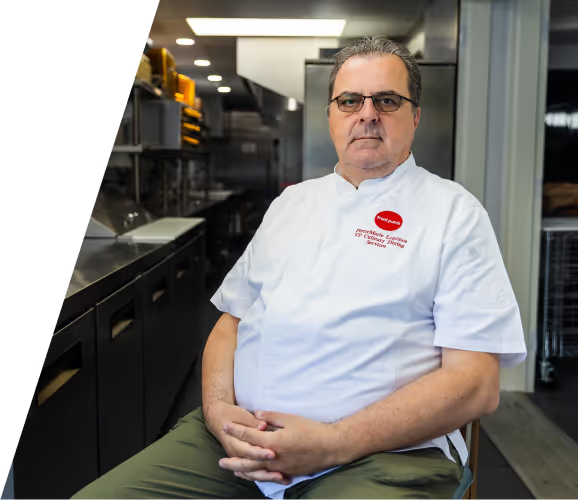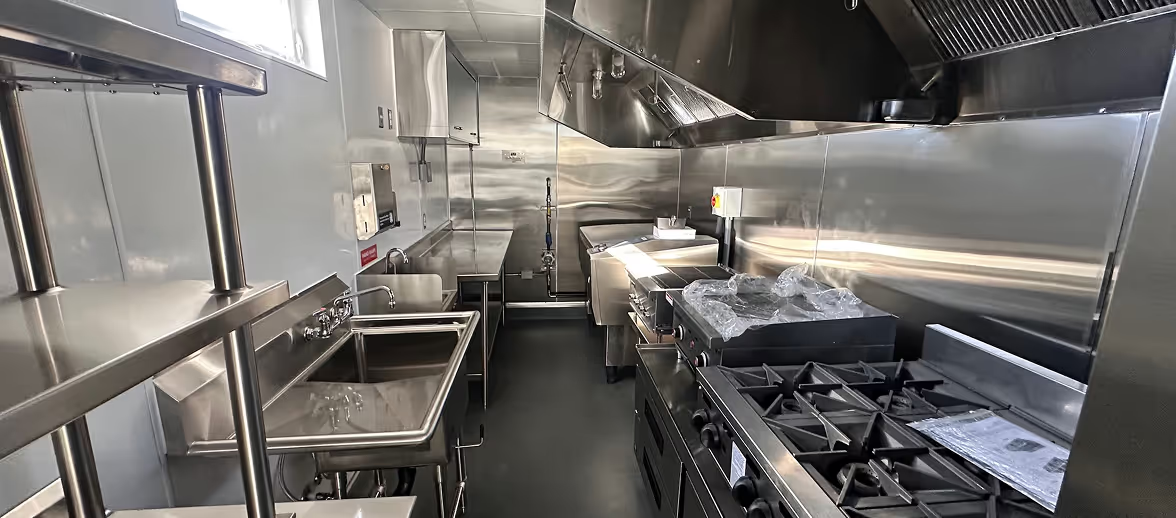.jpeg)
Why the Design of a Mobile Kitchen Matters in Rentals
What if every day of downtime cost you $1,900? That’s the average financial hit for commercial kitchens during closures, according to the National Restaurant Association. In high-end hospitality, where guest satisfaction, operational efficiency, and brand reputation are on the line, even a single day of lost service can have significant consequences. That’s why mobile kitchen rentals—when designed and executed well—are far more than a temporary fix; they’re a vital part of business continuity planning.
These aren’t food trucks or improvised trailers. Today’s mobile kitchens are purpose-built units engineered to match the performance, compliance, and layout of permanent commercial kitchens. Designed for high-volume use and rigorous health and safety standards, they offer unmatched flexibility and rapid deployment without compromising on quality.
In this guide, we’ll explore how mobile kitchens are strategically designed, fabricated, delivered, and operated for rental use—specifically with the demands of the hospitality sector in mind. From overcoming logistical challenges to meeting code requirements, you’ll discover what makes a mobile kitchen rental not just functional, but truly reliable.
What Are Mobile Kitchens and What Types Exist?
Mobile kitchens are self-contained, transportable kitchen facilities designed to meet commercial cooking standards.
Common types include trailer units, which are easily towable and suited for diverse transport needs; containerized kitchens, known for their durability and suitability for long-term or semi-permanent setups; and food trucks, which are compact and ideal for urban environments or events that require mobility and quick setup.
Who Uses Mobile Kitchens and When?
A wide range of hospitality businesses rely on mobile kitchens to maintain seamless operations during times of change or increased demand. These include luxury resorts, golf and country clubs, hotels, ski lodges, and event venues. Mobile kitchens are particularly useful during renovations, seasonal surges in guest volume, weddings and special events, emergency relief efforts, and for training staff on new kitchen layouts or equipment without disrupting core operations.
%2520(1).jpeg)
Design & Engineering of Commercial Mobile Kitchens
Modular Layouts Built for Versatility
Mobile kitchens are designed with interiors that adapt to various functions, such as events, emergency response, or temporary kitchen replacements during renovations. Equipment can be swapped out based on specific menu needs, making the unit versatile for different foodservice operations without requiring structural changes.
Note: Modular systems can reduce setup time by up to 50% compared to traditional installations.
Smart Utility Planning
Each mobile kitchen trailer is built with fully integrated utility systems—covering propane, water, and electrical. These systems support both on-grid and off-grid functionality, offering operational flexibility for any location, from urban event sites to remote areas.
Ergonomics and Safety by Design
Efficiency and safety are put into the layout of every mobile kitchen. Strategic equipment placement reduces movement, boosting staff productivity and minimizing physical strain. Key safety features such as non-slip flooring, ADA-compliant access, and integrated fire suppression ensure both accessibility and protection for all users.
Note: Ergonomic designs can reduce worker fatigue by up to 25% (source).
Compliance and Regulation Readiness
Mobile kitchens for lease are built to exceed regulatory standards, including local health codes, NSF certifications, and ADA compliance. This proactive approach minimizes delays and prevents costly modifications after deployment, making them ideal for rapid activation in regulated environments.
%2520(1).jpeg)
Fabrication for Long-Lasting Mobile Kitchen Trailers
Durable Materials for Heavy Use
Fabricated with high-quality materials like stainless steel, commercial mobile kitchens are made to endure heavy use and rigorous cleaning routines. Their waterproof, seamless surfaces improve sanitation and simplify maintenance, supporting longevity in demanding environments.
Note: Stainless steel kitchens can have a lifespan exceeding 20 years with proper care.
Standardization Across Fleet
Standardizing layouts and components across a mobile kitchen rental streamlines maintenance and operation. Using consistent equipment reduces complexity, allows quicker technician training, and ensures faster repairs using interchangeable parts.
Testing Before Delivery
Before deployment, each mobile kitchen undergoes complete quality testing. This includes functional checks for plumbing, gas, and electrical systems, as well as fire suppression certification—ensuring units are field-ready from day one.
.jpeg)
Seamless Delivery & Installation of Mobile Kitchens
Built for Mobility and Longevity
Built for transport, mobile kitchen trailers are DOT-compliant and designed to withstand the rigors of road travel. Equipment is protected through shock-absorption features that safeguard delicate components during transit, increasing operational longevity.
Fast and Easy Setup
Ease of deployment is critical. These mobile kitchens feature color-coded utility hookups and built-in leveling systems to enable fast, hassle-free setup. This efficiency benefits short-term activations and high-pressure environments alike.
Note: Properly built units can be operational within 2-4 hours of delivery.
Site Adaptability
Mobile kitchens are designed to operate in a wide range of environments—including uneven terrain and temporary infrastructure. Their utility systems can easily adapt to the available onsite resources, making them highly versatile in both urban and remote settings.
Documentation and Training
Every mobile kitchen rental includes thorough support materials such as user manuals, quick-start guides, and in-person walkthroughs. These ensure a smooth transition for the client team and help operators feel confident using the unit effectively from day one.
.jpeg)
Operations & Post-Installation Support for Mobile Kitchens
Fast Turnover Between Rentals
Cleanability is a top priority for operators. Smooth, waterproof surfaces and integrated drainage make these mobile kitchen trailers easy to clean quickly, helping to speed up transitions between clients or events.
Note: Efficient cleaning design can reduce downtime between rentals by up to 40%.
User-Friendly Experience
Designed for clarity and ease, mobile kitchens feature intuitive layouts and clearly labeled systems, making them simple to operate—even for temporary or newly trained staff. This helps ensure consistent, efficient use across varied staffing scenarios.
Maintenance & Serviceability
Maintenance access is a core design feature of mobile kitchen trailers. Key systems—plumbing, electrical, and gas—are easily reachable through dedicated access points. Standardized components across units reduce repair time and increase uptime.
Performance Monitoring and Upgrades
Mobile kitchens often feature telemetry systems that monitor kitchen performance in real time. These tools track gas usage, temperature, and system health, enabling proactive maintenance. Modular buildouts also allow for future upgrades as technology and culinary trends evolve.
.jpeg)
How Mobile Culinaire Designs Premium Rental Kitchens
Manufactured In-House
Unlike competitors who retrofit old trailers, Mobile Culinaire designs and builds every unit in-house in Oregon. With over 400 modular and mobile units designed and manufactured, they ensure meticulous attention to detail and premium quality. Our comprehensive control guarantees trailers that consistently deliver exceptional performance and reliability.
A Mobile Kitchen Trailer Specialist
As dedicated specialists with 10 years experience in the field, Mobile Culinaire leverages extensive industry experience to expertly navigate regulatory and operational requirements. This deep understanding uniquely positions them to provide tailored mobile kitchen solutions, fulfilling each client's specific needs.
Seamless Rental Experience
From initial inquiry to efficient delivery and rapid setup, the process is carefully designed to minimize disruption. All logistical details are handled seamlessly, allowing their clients to focus solely on providing outstanding hospitality and dining experiences.
Conclusion & Strategic Value for Hospitality Businesses
Why Design Dictates Performance in Mobile Kitchens
A poorly designed kitchen can slow down service, increase labor costs, and cause compliance issues. Professionally engineered mobile kitchens streamline operations, ensure safety, and adapt to high standards of culinary performance.
Mobile Culinaire’s Value-Engineered Rental Solutions
Backed by years of field-proven designs and in-house manufacturing expertise, Mobile Culinaire provides high-capacity, low-disruption mobile kitchen solutions. Our rentals are engineered to feel and function like permanent installations.
Need a mobile kitchen that’s engineered for performance and built to comply? Explore our rentals, view our project portfolio, or contact us directly to schedule your discovery consultation today.
%2520(1).jpeg)
People Also Ask (FAQ)
What materials are mobile kitchens typically built from?
Mobile kitchens are typically built with a steel or aluminum frame for durability and mobility. Stainless steel is widely used for interior surfaces due to its hygiene, heat resistance, and ease of cleaning. Insulated wall panels, non-slip flooring, and fire-rated materials ensure safety and efficiency. All components comply with health and fire codes for commercial kitchens.
How do mobile kitchen trailers handle ventilation and HVAC?
Mobile kitchen trailers use commercial-grade ventilation systems with exhaust hoods, grease filters, and fire suppression to remove heat, smoke, and grease. HVAC units (often rooftop or wall-mounted) provide climate control, ensuring safe cooking conditions and comfort. Proper airflow is maintained through intake and exhaust fans.
What size mobile kitchen is ideal for high-volume service?
For high-volume service, units measuring approximately 40-53 feet are optimal, capable of serving 500 to 800 meals daily. For instance, Mobile Culinaire’s 53-foot models efficiently support around 650 meals per day (source).
Testimonial

"What is standing out when you look at the mobile kitchen operation is the efficiency that we can really achieve because it's built for that."
Tell us about your kitchen needs and request a quote.
.png)
Turnkey mobile kitchen
.png)
Proudly made in-house in the USA
.png)
Commercial grade kitchen equipment
.png)
Code-compliant
Trusted by Industry Leaders




.gif)

%20(1).avif)
%20(1).avif)
%20(1).avif)